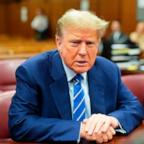Poll: Voter Interest High
Oct. 5, 2004 — -- With unusually high voter interest in this year's presidential race, a vast majority of likely voters plan on tuning in to tonight's debate between John Edwards and Dick Cheney — far more than four years ago.
Seventy-six percent of likely voters in an ABC News tracking poll plan to watch the debate, sharply up from 57 percent before the vice-presidential debate between Cheney and Joe Lieberman in 2000.
That follows a pattern of high interest in this year's contest: Fifty-six percent of likely voters say they're following the presidential race "very closely," compared with 37 percent at this point in 2000. And 76 percent of Americans now say they're registered to vote, five points more than in an ABC News/Washington Post poll in early October 2000.
Democrats were less engaged than Republicans or independents at this point in 2000. Now, however, voters of all political stripes are paying close attention — 58 percent of Republicans and 54 percent of Democrats and independents alike.
Women are 10 points less likely than men to be following the contest very closely (51 percent to 61 percent), a frequent difference in attention to politics. It's especially true of married women with children at home; four in 10 are closely following the campaign. Moveable voters are less engaged as well, with 40 percent paying very close attention.
Interest in the first presidential debate last week was about as high as it was in 2000. But broader attention to the race overall this year is generating more than usual interest in the vice-presidential debate. As noted, likely voters are 19 points more apt to plan on watching the debate tonight.
While interest is equally high among most demographic groups, Sen. John Kerry's supporters are seven points more likely than President Bush's to say they'll tune in. That could reflect enthusiasm among Kerry's supporters in the wake of the first presidential debate, which voters by more than 2-1 say Kerry won.
In Monday's tracking poll, 44 percent of likely voters had a favorable opinion of Cheney, 43 percent unfavorable, with 13 percent undecided — a weak level of personal popularity. Edwards was rated more positively than negatively, 45 percent to 30 percent, but with twice as many undecided — 25 percent.
The debates therefore pose different tasks for these two candidates: for Cheney, an opportunity to improve his popularity, and by extension his ticket's standing; for Edwards, a chance to better establish his image — and more broadly to turn Kerry's gains from the first debate, which boosted his favorability rating by eight points, into votes.
For now, vote preferences have remained stable. In today's results, a three-day average of Saturday through Monday night polling, 51 percent of likely voters favor Bush, 45 percent Kerry and 1 percent Ralph Nader.
Like Kerry and Bush on Thursday, Cheney and Edwards tonight will be vying for moveable voters, among the most prized voter groups in any election.
In this poll, moveables (those who haven't definitely chosen a candidate) account for 15 percent of likely voters. The race is split among moveables — 44 percent for Bush, 42 percent for Kerry and 5 percent for Nader, with 8 percent still undecided.
Not surprisingly, there's remarkable consistency among definite voters: They favor Bush over Kerry by seven points, 53 percent to 46 percent, about the margin since before last week's debate.
Compared with other voters, moveables are more likely to be independents and less likely to be following the campaign very closely. These make them a difficult target for the campaigns to reach — and in turn make the high-profile debates all the more important.
Tonight is an opportunity: Nearly three-quarters of moveables, 72 percent, say they plan on watching the vice-presidential debate.
This poll was conducted by telephone Oct. 2-4 among a random national sample of 1,806 adults, including 1,461 registered voters and 1,160 likely voters. The results have a three-point error margin for the likely voter sample. ABC News and The Washington Post are sharing data collection for this tracking poll, then independently applying their own models to arrive at likely voter estimates. Sampling, data collection and tabulation were done by TNS of Horsham, Pa.
See previous analyses in our Poll Vault.




